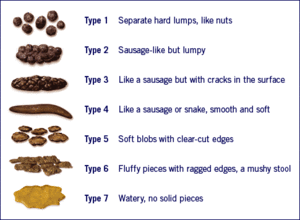Diarrhea
Diarrhea or diarrhoea is the condition of having at least three loose or liquid bowel movements each day. It often lasts for a few days and can result in dehydration due to fluid loss. This can progress to decreased urination, loss of skin colour, a fast heart rate, and a decrease in responsiveness as it becomes more severe. In the context of psychoactive substance usage, certain compounds have been known to induce diarrhea or can at least increase the likelihood of it occurring.[1][2][3] This is not as dangerous as the same condition when it occurs through infection as it only remains until the person is no longer under the influence of the drug.
Diarrhea is often accompanied by other coinciding effects such as nausea and dehydration. It is most commonly induced under the influence of heavy dosages of certain psychedelic compounds, such as ayahuasca, mescaline, and psilocybin mushrooms. However, it can also occur under the influence of certain stimulants, modafinil, and caffeine.
Psychoactive substances
Compounds within our psychoactive substance index which may cause this effect include:
Experience reports
Annectdotal reports which describe this effect with our experience index include:
See also
External links
References
- ↑ Tanaka, E., Kamata, T., Katagi, M., Tsuchihashi, H., Honda, K. (November 2006). "A fatal poisoning with 5-methoxy-N,N-diisopropyltryptamine, Foxy". Forensic Science International. 163 (1–2): 152–154. doi:10.1016/j.forsciint.2005.11.026. ISSN 0379-0738.
- ↑ Shulgin, A. T., Carter, M. F. (1980). "N, N-Diisopropyltryptamine (DIPT) and 5-methoxy-N,N-diisopropyltryptamine (5-MeO-DIPT). Two orally active tryptamine analogs with CNS activity". Communications in Psychopharmacology. 4 (5): 363–369. ISSN 0145-5699.
- ↑ Muller, A. A. (October 2004). "New Drugs of Abuse Update: Foxy Methoxy". Journal of Emergency Nursing. 30 (5): 507–508. doi:10.1016/j.jen.2004.07.037. ISSN 0099-1767.
